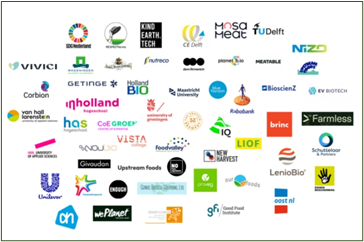FKII newsletter vol.10(Date 1/23/2025)
◆Contents◆
1. The Netherlands: policy and technology creating a hub for alternative proteins
Publishing an email magazine for overseas members
At the Field for Knowledge Integration and Innovation (FKII) , we publish an email magazine for overseas members with the aim of presenting the activities of the FKII 'R&D platform' and disseminating overseas trends.
We plan to send out an irregular email magazine several times this year.
----------------------------------------------------
1. The Netherlands: policy and technology creating a hub for alternative proteins
----------------------------------------------------
Denise Lutz, Agricultural Counsellor, Embassy of the Kingdom of the Netherlands
The Netherlands has a highly developed and competitive agri-food sector. As a result of the innovative character, intersectoral collaboration and international perspective of the Dutch agrifood sector, the Netherlands has become the second-largest exporter of agricultural products in the world, second only to the U.S, as is well-known. Less well-known, however, is that the country has developed into one of the world's biggest alternative protein hubs over the past two decades.
Driving this development is a mix of factors:
• a growing awareness of the environmental and climate impact of meat and dairy production, both domestically as well as globally;
• an increasingly strong push from Dutch society for more attention to animal welfare;
• a growing concern over the health implications of dietary imbalances as western diets are characterized by an excessive uptake of protein per capita, mostly of animal origin;
• strategic concerns over the dependency on imports for protein-rich crops such as soy, for use in food but most of all in feed.

Figure 1. Sushi with plant-based tuna (Courtesy Ojah)
Alternative protein pioneers in the food industry, such as Dutch dairy giant Friesland Campina which launched a successful brand of meat analogues based on dairy and algae in 2005 and newcomer The Vegetarian Butcher, have been primarily motivated by societal concerns over animal welfare and the environment. Meanwhile, broader concerns about public health and food security have underpinned policy development in addition to the concerns mentioned-above.
Policy
In December 2020, after consultation with 225 stakeholders, the Dutch government established its first National Protein Strategy. The main aim of the strategy is to increase self-sufficient levels of plant-based and innovative proteins over a period of five to ten years by increasing domestic production of protein-rich crops, stimulating R&D on plant-based protein sources for food and feed as well as cultured meat, and stimulating research on the usage of insects and residual flows as feed and food. Finally, the strategy aims to increase the share of plant-based proteins in consumer diets to restore a healthy balance for people and planet between animal and alternative or plant-based proteins.
Innovation is an important pillar of the strategy. As with other innovation areas in the Netherlands, public funding of research and development of alternative proteins and alternative production processes predominantly targets projects of collaboration between private sector companies, research institutions and civil society. There are many projects on-going, addressing innovation questions like finding new protein sources, increasing product quality, building new product chains and building knowledge to stimulate the consumer towards acceptance of new protein sources. Promising areas of innovation for food and feed concern microbial proteins, fermentation, fungi, yeasts, bacteria and micro-algae. Research and development of cultivated meat, or cellular agriculture - in which Dutch pioneers Willem van Eelen, who is recognized as one of the godfathers of cultured meat, and Mark Post, who famously launched the world's first cultured meat hamburger in 2013, played a crucial role worldwide - is also supported.
Industry
The food industry saw a number of initiatives already early on in the 1990s to get people to eat more plants and less animals with a view to animal welfare and/or environmental considerations. But the movement towards more plant-based products gained momentum after the turn of the century. Now over 250 companies in the Netherlands are working on alternative protein solutions. As a result, there are many plant-based products available on the Dutch market. Most products are made from bean varieties (e.g. faba, lupin and soy) but there is also a trend of tastily prepared vegetables replacing meat. As most products intend to replace meat, a lot of effort is put into mimicking meat. To improve on the taste and texture of plant-based meat products, producers increasingly look to innovative ingredients produced by means of extrusion, fermentation and precision fermentation technologies. Not surprisingly, the Netherlands is also home to many companies specializing in the production of innovative ingredients as well as new protein sources, like protein from grass, duckweed or insects, for use in animal feed or food.
Ecosystem
Realizing the need for re-thinking the food system and creating alternative protein solutions with preferably global impact, novel food parties, start-ups and corporates from the meat, dairy and fish sectors increasingly bounded together, eventually forming the Dutch 'Future Protein' ecosystem in which animal and alternative protein solutions are complementary. Foodvalley NL and the Cellular Agriculture Netherlands Foundation (CANS) play a critical role in further strengthening the future protein ecosystem.
In 2017 Foodvalley NL, the independent organisation developing and strengthening the international ecosystem for the future of food in the Netherlands, together with a number of Dutch provinces initiated The Protein Community (TPC). In this community, alternative protein startups and corporates are coupled with inspiring international partners, capital, unique facilities, and provided with knowledge and in-depth events, to accelerate their innovations and business growth. Currently, TPC consists of 150 partners worldwide of which 25% startups, 40% SMEs, 15% corporates and 20% enablers. See figure 2.

Figure 2. The Protein Community
While TPC focuses on plant-based proteins, CANS was established to further develop the Dutch cellular agriculture ecosystem. As cultured meat is not an alternative protein, but an alternative production process, this future protein has its own set of challenges. In addition to technological development, social integration and acceptance involving farmers as well as consumers, for example, is an important topic, as well as regulatory development. Cultivated meat products at present cannot enter the Dutch (and EU) food market due to the strict EU Novel Food Regulation. However, with the aid of CANS the Netherlands has been able to develop a framework for tasting to stimulate innovation and product optimalization. To further aid in the development the Dutch government in 2023 pledged to CANS support of in total € 60 million (2024 to 2032).

Figure 3. The Dutch Cellular Agriculture Community
Comparing Japan to the Netherlands
Different to the Netherlands, protein overconsumption or protein imbalance is not an issue in Japan. The ratio of plant- and animal-(fish-)derived protein in the average Japanese diet is far better than that of the Dutch diet. Nevertheless, as a major food importer, including of meat and fish, Japan has a considerable global environmental footprint to consider. In addition, Japan's high dependency on food and feed imports is long considered a strategic concern (food security). Stimulating the domestic production and consumption of more plant-based proteins to ensure a healthy diet accessible to all may therefore be a good choice for Japan as well. At the least the global market for alternative proteins offers chances for Japanese companies. The Netherlands, home to leading startups, companies and research institutes in the field of alternative proteins, is open to collaboration.
Note: For this article use was made of "Future Protein NL - グローバルな課題への取り組み", a magazine issued by the East Netherlands Development Agency (Oost NL) to inspire and inform about what is going on the Netherlands in the field of alternative proteins. For the Japanese version see https://investinholland.com/wp-content/uploads/2022/09/Future-Protein-NL-in-Japanese.pdf